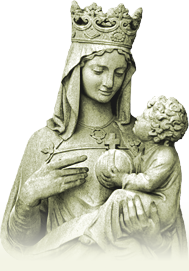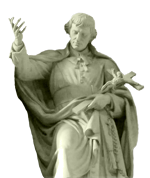Church
What now? How does ecumenism end up? How dows Second Vatican Council end up?
Orlando Fedeli
"With the Vatican II Council, the "seeds of the Word", expression of Saint Justin, were used as base of the ecumenical ideology. It was said, so, at the conciliar rooms, that in the pagan religions one could find "seeds of the Word"...
Indeed, in the Chapter II, ART. 1, CHRISTIAN WITNESS, of the Conciliar Decree AD GENTES, it is read:
« 11. The Church must be present in these groups through her children, who dwell among them or who are sent to them. For all Christians, wherever they live, are bound to show forth, by the example of their lives and by the witness of the word, that new man put on at baptism and that power of the Holy Spirit by which they have been strengthened at Conformation. Thus other men, observing their good works, can glorify the Father (cf. Matt. ES:16) and can perceive more fully the real meaning of human life and the universal bond of the community of mankind.
In order that they may be able to bear more fruitful witness to Christ, let them be joined to those men by esteem and love; let them acknowledge themselves to be members of the group of men among whom they live; let them share in cultural and social life by the various. undertakings and enterprises of human living; let them be familiar with their national and religious traditions; let them gladly and reverently lay bare the seeds of the Word which lie hidden among their fellows… »
Therefore, according to Vatican II, there would be "seeds of the Word" also in false religions. And now, Benedict XVI surprises all of us with this speech on Saint Justin, last Wednesday, March 21, by saying that in pagan religions there were not "seeds of the Word" and that Saint Justin never said that.
On the contrary, Saint Justin said that it could find "seeds of the Word" in Greek philosophy, but never in the pagan religions which were diabolic, according to the words of Benedict XVI:
“In fact, the first Christians refused any compromise with the pagan religion. They considered it idolatry, even at the cost of being accused as "impious" and "atheists." In particular and especially in his first "Apology," Justin harshly criticized the pagan religion and its myths, which he considered diabolical "disorientations" on the path to truth. [... ] Justin, and with him other apologists, took the position of the Christian faith as the God of the philosophers instead of the false gods of the pagan religion. It was a choice for the truth of being versus the myth of traditions."
Benedict XVI, thus, contradicted the Vatican II Council!...
Where were, then, the "seeds of the Word"?... In the pagan religions or Greek philosophy?.
1º - They defended the Faith against the "from the weighty accusations of the pagans and the Jews ";
2º - They diffused the Christian doctrine.
Two things that ecumenists never made and that they hate that one makes. And the Pope concludes:
"In an era such as ours, marked by relativism in the debate on values and on religion -- as well as in interreligious dialogue -- this is a lesson that should not be forgotten ".
Thus, Benedict XVI shook the two columns of ecumenism:
1º - What the Vatican II Council said in the AD GENTES Decree, which there was "seeds of the Word" in the pagan religions, that is false;
2º - the present interreligious dialogue is relativistic.
I hope that, in spite of my poor English, I have had succeed in presenting a summary of this article which I subject to your consideration.
Let’s pray for the Pope, so that he "is not concealed, by fear, in front of the wolves".
Para citar este texto:
"What now? How does ecumenism end up? How dows Second Vatican Council end up?"
MONTFORT Associação Cultural
http://www.montfort.org.br/eng/veritas/igreja/sementes_ecumenismo/
Online, 15/12/2025 às 07:07:49h








